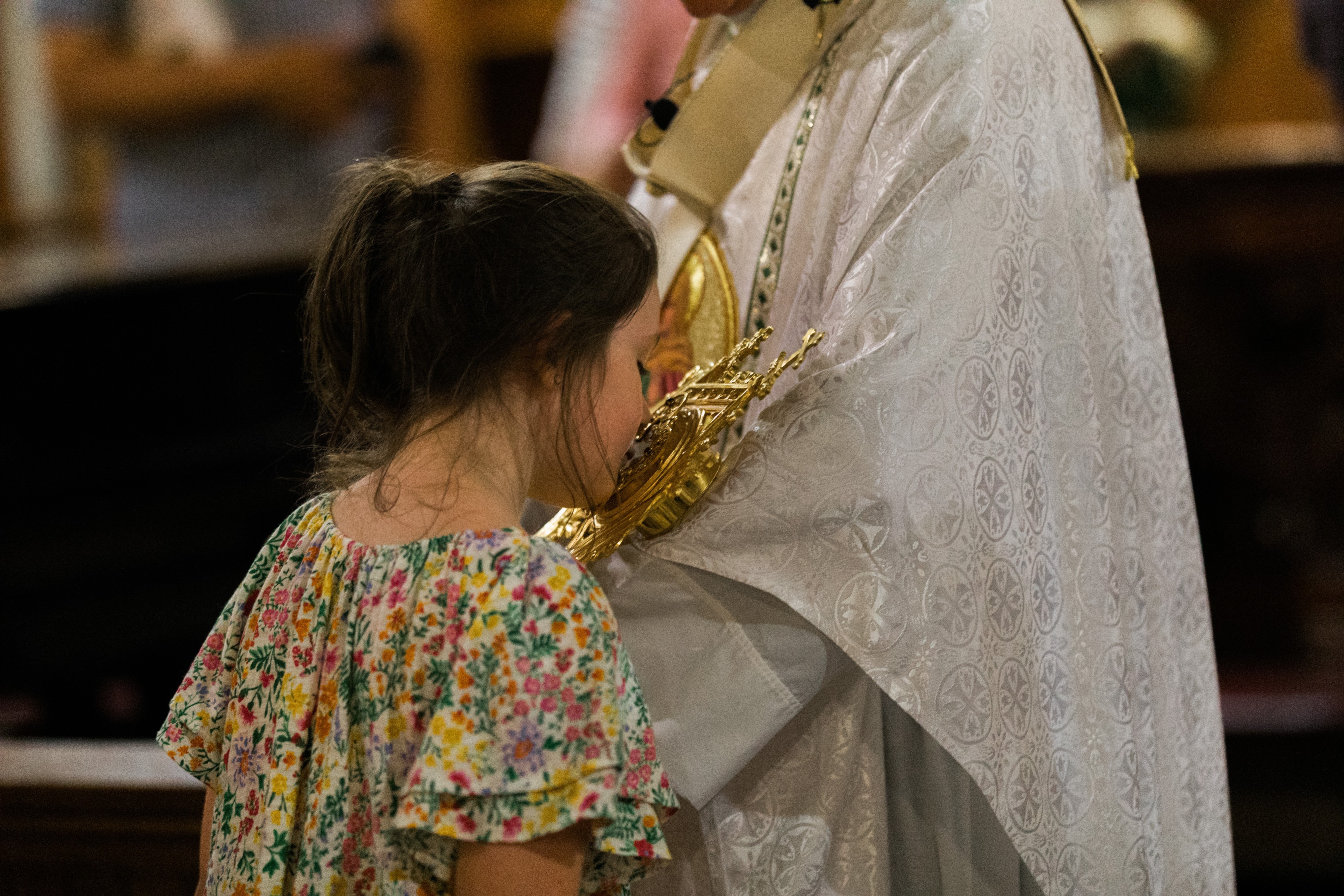Faithful gather at Detroit's first parish to honor the grandmother of Jesus, patroness of the city
DETROIT — Detroit Archbishop Allen H. Vigneron couldn’t help but make a comment at the atmosphere in the room.
A Michigan summer in late July in Detroit’s oldest parish makes for a very warm occasion, but before the packed church, Archbishop Vigneron compared the warm temperature to the energy of the faithful.
“On a natural level, the atmosphere is warm, but on the supernatural level, it’s warmer,” Archbishop Vigneron said. “It’s palpable to understand we’re members of God’s family — God, the Son of Man, who had a mother who was formed in the womb, who had parents, Joachim and Anne, grandparents of God incarnate. So as we are about to meet God in the flesh, let us recall the very real incarnate family of Jesus Christ.”

The July 26 feast of St. Anne was a chance for Catholics in Detroit to celebrate the patroness of the archdiocese. After French explorers landed “by the straits” to settle Detroit on July 24, 1701, two French priests celebrated Mass in the first makeshift chapel in the city, Ste. Anne de Detroit.
Since the city’s founding, prayers to Ste. Anne have called upon the patron saint of childless mothers, unmarried women and grandparents for her intercession.
The annual novena gained special notoriety in Detroit in 2011, when Pope Benedict XVI named St. Anne the city's official patroness, and again in 2017, when Archbishop Vigneron made Ste. Anne Parish the official archdiocesan shrine to St. Anne. But pilgrims have traveled to the 1886-built church on the corner of Ste. Anne and Lafayette with their intentions since long before that.
The story of St. Anne and her husband, St. Joachim, shows that God wants to be known through families, Archbishop Vigneron said, because humans understand the family bond.


“God decided to sanctify us through this simple strategy, sending His son, formed in the womb, in Mary, daughter of Joachim and Anne,” Archbishop Vigneron said. “We all started with a family. We all understand parents and grandparents. In that language, God became a human being.”
Archbishop Vigneron recalled the struggles of St. Anne and St. Joachim, how Anne did not conceive for a long time, so the two prayed to God for a child. It’s an example of struggle and faith that many can find relatable, Archbishop Vigneron said.
“The Son of God, who created the whole world, has a mother, Mary, and has grandparents Joachim and Anne,” Archbishop Vigneron said. “And because of that, we have a family. It’s not a strange language God is speaking; He is using human words. He is speaking by His love, His works, and on this great feast day, the Son of God has grandparents, and brothers and sisters: me and you. It doesn’t bother God to have ordinary folks in His family.”

The feast day was the culmination of nine days of prayer at Ste. Anne Parish, including Masses celebrating various devotions and cultures within the Catholic Church, from Irish and French to Chaldean and Hispanic devotions. During the Mass, the faithful had the opportunity to receive a blessing with a first-class relic of Ste. Anne.
The night before, the archbishop prayed a special ecumenical vespers service at the Cathedral of the Most Blessed Sacrament with members of the local Catholic and Orthodox communities.
After the feast day Mass at Ste. Anne, the parish hosted a raffle with proceeds benefiting renovations at the church, the seventh in the parish’s illustrious history, and food and drinks were served in the plaza outside, with dancing and music celebrating the parish's past and future.
“This is the good news our ancestors celebrated two days after the founding of the city,” Archbishop Vigneron said. “More than 300 years ago, they had this desire to see God, to be free through God. They had an extraordinary need to be on mission to join their families to God’s family.”

Archbishop Vigneron said the exploring spirit of the first European families who settled into the area — whose legacy is made known with the family names on the church’s stained-glass windows — is linked to the missionary spirit of today’s Detroiters, who carry on the mission of spreading the kingdom of God in southeast Michigan.
“What loves requires from us, as we see in Unleash the Gospel, is that we do this out of glory to God and respect and obedience to Jesus Christ,” Archbishop Vigneron said. “Jesus wants all of us to be His brothers and sisters, and to have Joachim and Anne as their grandparents.”










